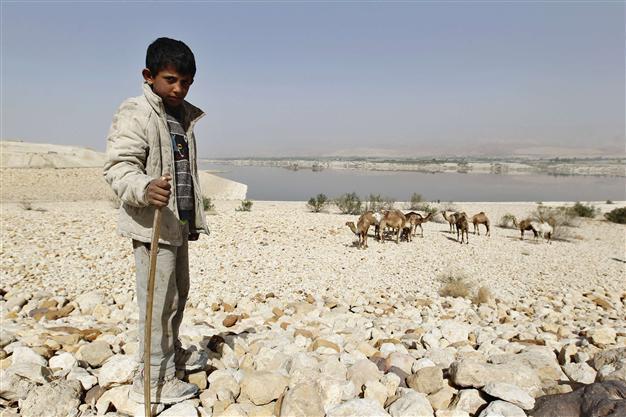Middle East drought a threat to global food prices
AMMAN - Reuters

A boy shepherds camels near Al Karamah Dam in Shouneh March 7. REUTERS photo
The Middle East’s driest winter in several decades could pose a threat to global food prices, with local crops depleted and farmers’ livelihoods blighted, U.N. experts and climatologists say.
Varying degrees of drought are hitting almost two thirds of the limited arable land across Syria, Lebanon, Jordan, the Palestinian territories and Iraq.
“Going back to the last 100 years, I don’t think you can get a five-year span that’s been as dry,” said Mohammad Raafi Hossain, a U.N. Food and Agriculture Organisation (FAO) environmental economist.
The dry season has already hurt prospects for the cereal harvest in areas of Syria and to a lesser extent Iraq. Several of the countries under pressure are already significant buyers of grain from
international markets.
“When governments that are responsible for importing basic foodstuffs have shortages in production, they will go to outside markets, where the extra demand will no doubt push global food prices higher,” said Nakd Khamis, seed expert and consultant to the FAO.
The Standard Precipitation Index (SPI) shows the region has not had such low rainfall since at least 1970.
This was part of the initial findings of a joint technical study on Drought Risk Management undertaken by several U.N. agencies, including the FAO, UNDP and UNESCO, that would be formally published later this month, Hossain said.
Water and agriculture authorities, alongside specialist U.N. agencies, have begun preparing plans to officially declare a state of drought that spreads beyond the Eastern Middle East to Morocco and as far south as Yemen, climatologists and officials say.
Drought is becoming more severe in parts of the Eastern Mediterranean and Iraq, while Syria, having seen several droughts in recent decades, is again being hit hard, said Mohamad Khawlie, a natural resources expert with Planinc, an international consultancy focused on geospatial studies in the Middle East and Africa (MENA) region.
Dependency on TurkeyExtracts from a soon-to-be released U.N.-commissioned study says drought in Iraq will persist, increasing in severity from 2017 to 2026, increasing further the dependence on foreign food imports by one of the top grains importers in the world.
The U.N. study extracts say Turkey, where much of Iraq and Syria’s water resources originate, has cut the volume of water flowing into the Euphrates and Tigris rivers by dam construction to meet their own growing domestic needs.
A poor rain season in Syria has already hit its 2014 wheat outlook in the main rain-fed areas in the north eastern parts of the country, which should be ready for harvest in June and July, Syrian agriculturalists say.
Experts say that even if late heavy rain comes in March, this will not save the rain-fed cereal harvest, which farmers are already resigned to relegating to animal fodder.
“When there is delay in rains, then the cereals will eventually wilt. Annual growth has not been achieved for the rain to come and continue maturity of the stalks,” Asmar said.
Crop production in the conflict-torn country that once boasted bumper wheat seasons is expected to decline further.
Syria’s wheat production is now pinned on the irrigated sown areas that depend on the Euphrates and underground water, which before 2011 accounted for no more than 40 percent of total annual production.
The drought and war could slash Syria’s total wheat output to less than a third of its pre-crisis harvest of around 3.5 million tonnes to just over a million tonnes in 2014. Agricultural experts say the most favourable estimates for last year’s harvest did not exceed 2 million tonnes.
Drought that peaked in severity during 2008 and 2009 but persisted into 2010 was blamed by some experts inSyria for the soaring food prices that aggravated social tensions and in turn triggered the 2011 uprising against President Bashar al-Assad.
“Prior to the protests, food costs were soaring. In fact, because of these food costs, the protests were instigated, so this was brought on by drought and lack of planning,” said FAO’s Hossain.
Economic hardship was aggravated by faltering public subsidy schemes that once efficiently distributed subsidised fertilisers and seeds to millions of drought-hit farmers in both Syria and Iraq, agro-economists add.
Middle-Eastern experts predict more frequent drought cycles in coming years, accompanied by delayed winter rainy seasons that damage fruits by promoting premature flowering and prevent cereal crops growing to full maturity.
“The climate change cycles are now shorter, which means ... we will eventually have less rain and more frequent droughts,” Fady Asmar said.
